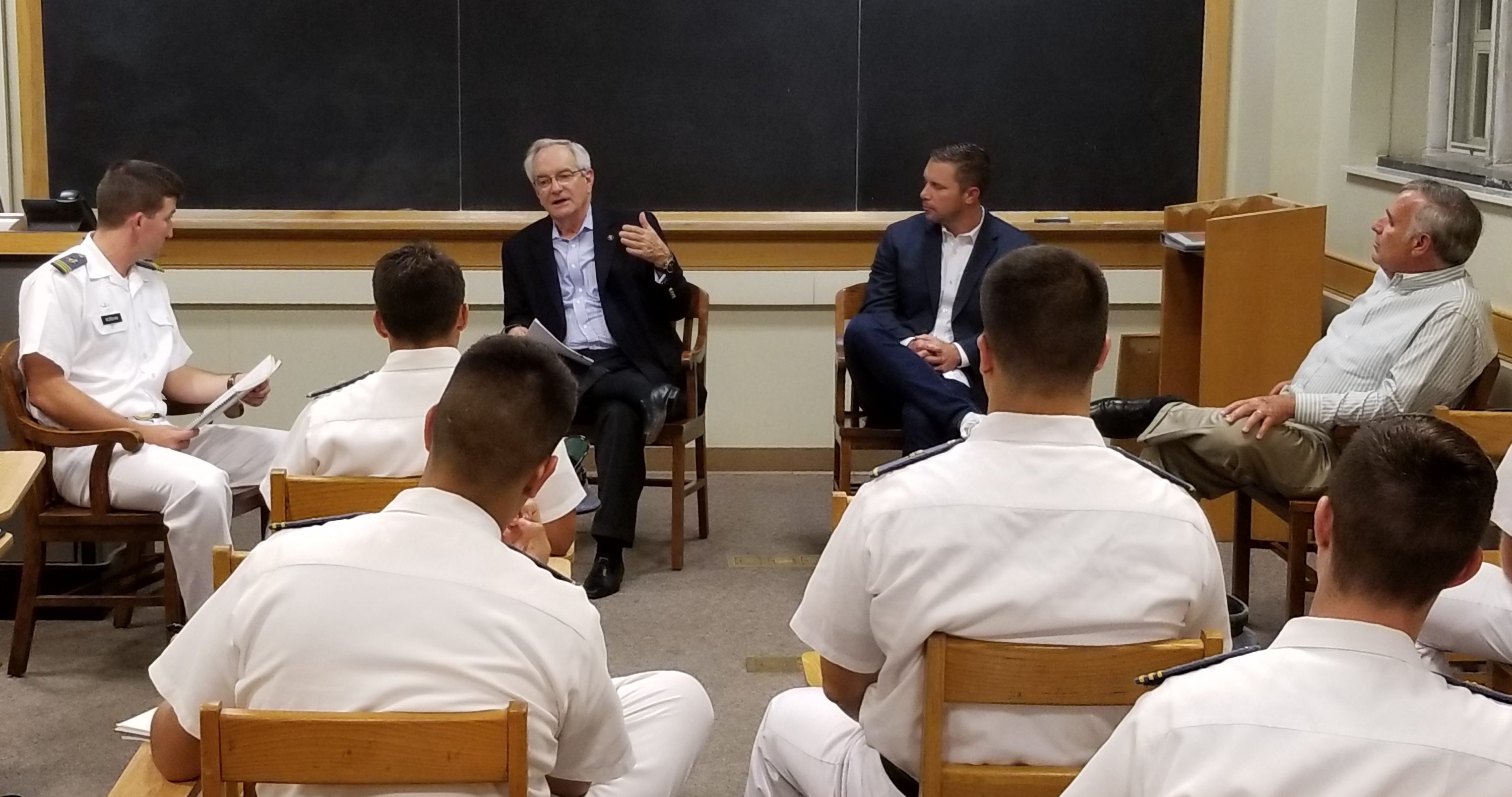Kemper ’68: A Passion for Mentoring

John Kemper ’68, left, during a panel discussion about entrepreneurship sponsored by the e-Club, joined by Rich Daughtridge ’98, right. Photo courtesy Maj. Dekuwmini Mornah, Ph.D.

John Kemper ’68, left, during a panel discussion about entrepreneurship sponsored by the e-Club, joined by Rich Daughtridge ’98, right. Photo courtesy Maj. Dekuwmini Mornah, Ph.D.
Most people have a particular passion; some have many. It might be for a certain author whose books they extol and give as gifts. It might be for a sports team or some form of activity. Often, this passion exists outside the world of work. “My job pays the bills,” someone might say, “but sailing is my passion.”
Some people – some highly fortunate people – are in the coveted place in which their passions are also their businesses. One such person is John E. Kemper ’68, who, since 2015, has been the chief executive officer of John E. Kemper, LLC, which provides strategic business advice to startup businesses and nonprofit organizations. In this position, Kemper gets to pursue what he describes as a passion: Mentoring.
When it comes to counseling men and women who are trying to start a business or grow an already established one, Kemper speaks from considerable experience. After four years of service as an officer in the U.S. Army Corps of Engineers and a decade as the director of public utilities for the city of Norfolk, he joined the corporate world in 1982, working for a large architectural and engineering firm as its director of corporate sales and marketing and opening its office in Washington, D.C.
Six years later, he entered the field of health care construction and facilities management as the vice president of McDevitt and Street Company. In 1993, he became a partner with W.R. Adams Company, Inc., and as its president and chief operating officer, he grew it into a company that was managing more than $275 million in health care facilities development annually. In 1999, Adams was sold to the London-based Bovis Lend Lease, an international real estate and construction services company. Kemper stayed on as executive vice president, working on projects related to health care in the United States and other countries, including the United Kingdom and Turkey.
In 2002, he took the amazing step of buying back the company and reestablishing it as the KLMK Group, a national health care consulting firm, for which he was its majority owner, chairman and CEO. The company was soon managing more than $1 billion of health care projects a year. Kemper sold a majority interest in the company in 2010 and sold his remaining interest in 2013 to a Forbes 400 company, CBRE Inc.
His resume states that Kemper “retired in 2014.” But, he apparently defined it differently than most, because he then set up his current company and started fostering the progress of entrepreneurs.
It’s not just his passion for mentoring that drove him to this new line of work but also his belief in the importance of entrepreneurship to Virginia and the country.
According to Kemper, Virginia’s economy has been too dependent for too long on the federal government, especially in northern Virginia and Hampton Roads. This has caused it to lag behind the rest of the nation in terms of economic growth and new business creation. More than this, “Virginia’s best and brightest have been leaving for opportunities in states that have more innovative and entrepreneurial business cultures,” said Kemper. Happily, over the past several years, Virginia’s government and business leaders have recognized that the federal government is, as Kemper puts it, “increasingly constrained, and are taking initiatives to reduce the state’s dependence on federal government jobs and contracts and are encouraging innovation and entrepreneurship.”
For Kemper, entrepreneurship’s benefits for the nation can be simply expressed, “It’s about taking good ideas and moving them forward. To me, that’s what makes this country tick and has for more than 200 years.”
Kemper, therefore, has enjoyed his role as a mentor – and occasional investor – in those men and women who have those good ideas and are looking to advance them. Asked how he evaluates a new business, Kemper replied, “I bet on the jockey, not the horse. Many people have a great vision but few can execute and implement it. So, I look for business founders and CEOs who are strong leaders who can think strategically and solve problems.”
To him, therefore, VMI is well positioned to nurture future innovators who will build the companies that will modernize Virginia’s economy and keep the United States ticking. As he sees it, successful entrepreneurs share numerous characteristics that alumni learn in barracks, among them leadership, discipline, integrity, determination, persistence and problem-solving. Thus, in 2016, he began working with Maj. Dekuwmini “Dee” Mornah, Ph.D., associate professor of economics and business, to support the innovation and entrepreneurship experience at VMI. As part of that assistance, Kemper has advised on the design and execution of the Business Leadership and Innovation Summit, the second of which will occur April 11-13, 2019, and has worked with the cadets in the VMI Entrepreneurship Club, often called “the e-Club,” of which Mornah is one of two faculty advisers.
Kemper has spoken to the members of the club, which now number more than 40, at VMI and when they have visited the Richmond area. He has pursued his passion for mentoring with them, too. Working with cadets is nothing new for him. He has been mentoring cadets who have been supported by the two basketball scholarships that he established – one in 2004 and the other in 2014. As a cadet, Kemper was considered one of the leading players in Virginia, and he was named first team All-State and second team All-Southern Conference in his 1st Class year.
“It’s funny,” he said, “how much cadets are surprised when I tell them that the U.S. Armed Forces all have innovation and entrepreneurial initiatives, and they are looking for people who have the entrepreneurial mindset. But, if you think about it, it makes sense. Look at how George Marshall [‘901] led the U.S. Army, quickly transforming it from a relatively small and somewhat backward institution into the world’s greatest and most modern fighting force. He had an entrepreneurial mindset, and he was always looking for officers who shared it. As it did 75 years ago, today’s military knows it must be open to new approaches in, well, everything if it is to be successful in its mission.”
Kemper is pleased when he can introduce cadets to other alumni who want to help them succeed. “They have heard about the VMI network, but often they are very surprised by its strength and how much the alumni in it want to assist them to be successful. A major goal of the e-Club, therefore, is to introduce cadets to the VMI network.”
Mornah explains that the involvement of alumni in the e-Club is important because “VMI can be a world of its own, which can make it difficult for cadets to see all of the advantages of a VMI education and how it prepares them for the challenges in an increasingly competitive world. More than anything, alumni provide inspiration, belief and mentorship. They help cadets see real-world value in the unique education that VMI provides. The pride that beams through the faces of alumni as they talk about how their experiences at VMI prepared them for the things they do is absolutely inspiring and provides cadets with hope and aspiration.”
According to Mornah, cadets also see alumni as having what he calls “authenticity.” He explains it this way, “To them, alumni are like big brothers and big sisters, and they can present messages that have an impact because cadets know they understand the VMI experience.”
Mornah says that Kemper has been able to connect with cadets well because “he is not only enthusiastic, but also a great example, someone who embodies everything VMI hopes its cadets become. His ‘can do’ attitude is utterly infectious, too.”
Asked what messages he provides cadets, Kemper points to the one about the challenges of being an innovator. The biggest challenge isn’t raising money or developing a product or service that people will want, he says. “The biggest challenge is committing yourself to executing and implementing your vision and transforming it from an intangible into a tangible, that is, a sustainable venture.”
“I also speak to the other side of that coin, that is, the biggest benefit to being an innovator.” And what is it? He smiles and replies, “Being in a position to control your own destiny.”

The communications officer supports the strategy for all communications, including web content, public relations messages and collateral pieces in order to articulate and promote the mission of the VMI Alumni Agencies and promote philanthropy among varied constituencies.